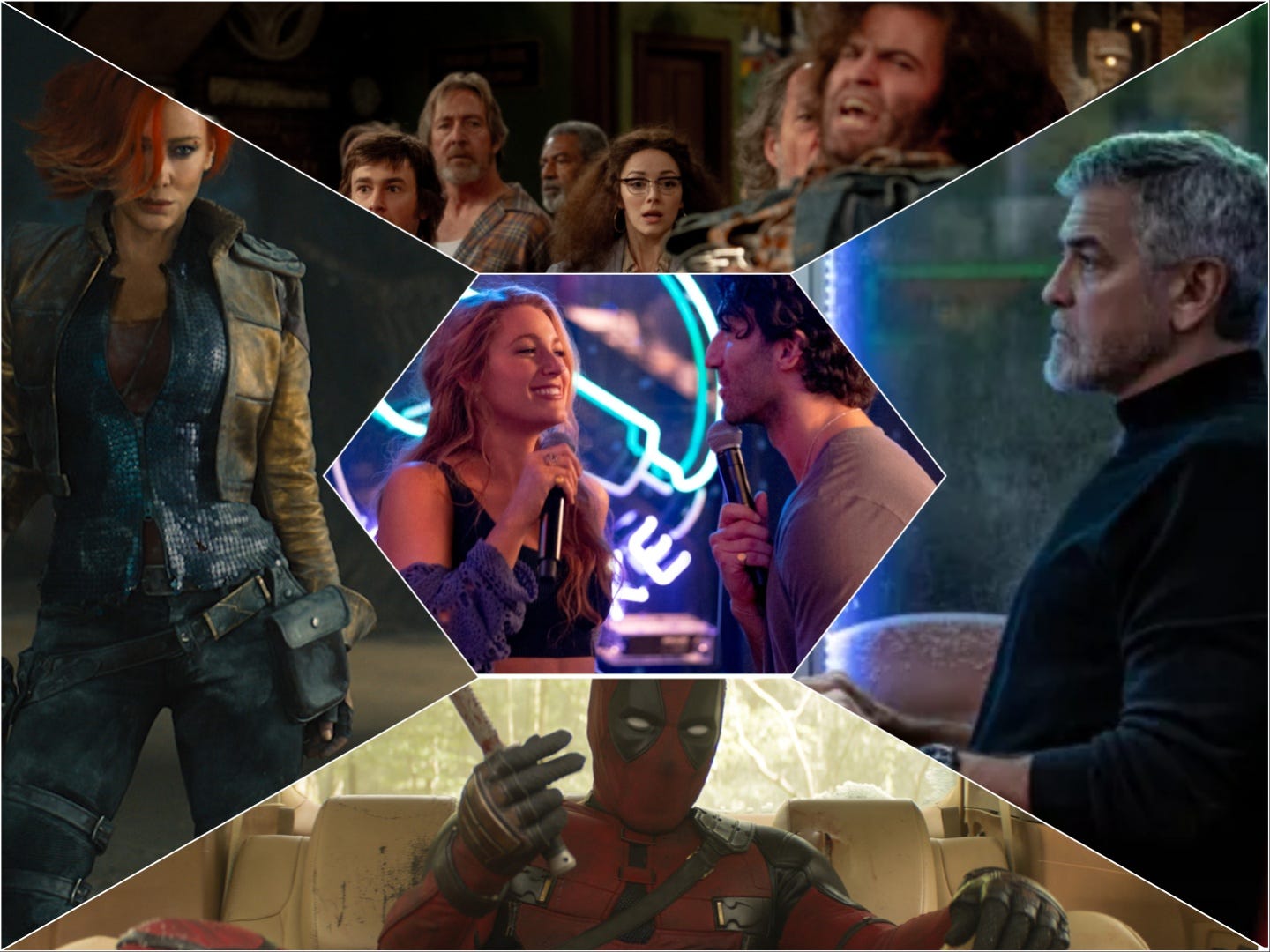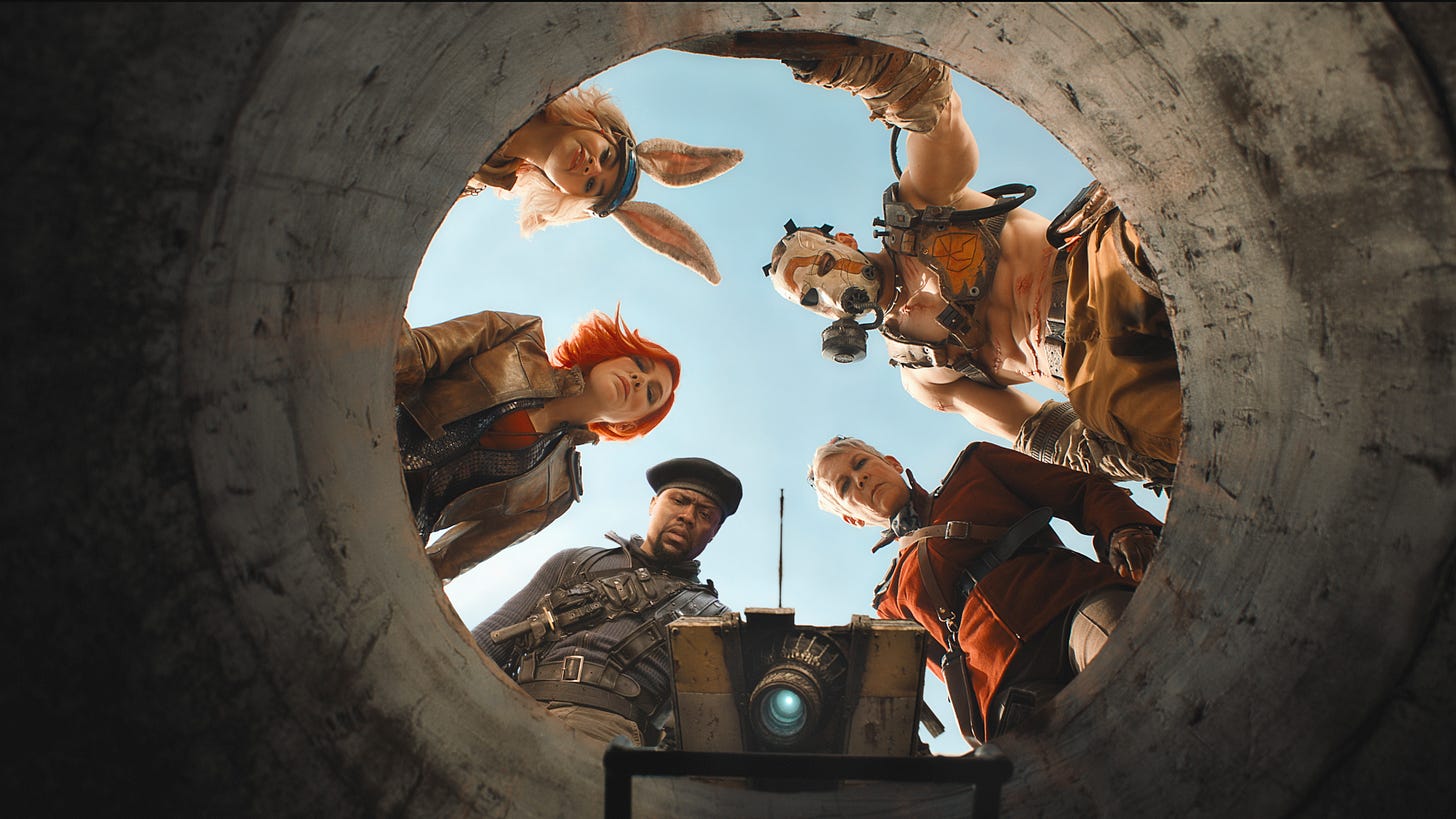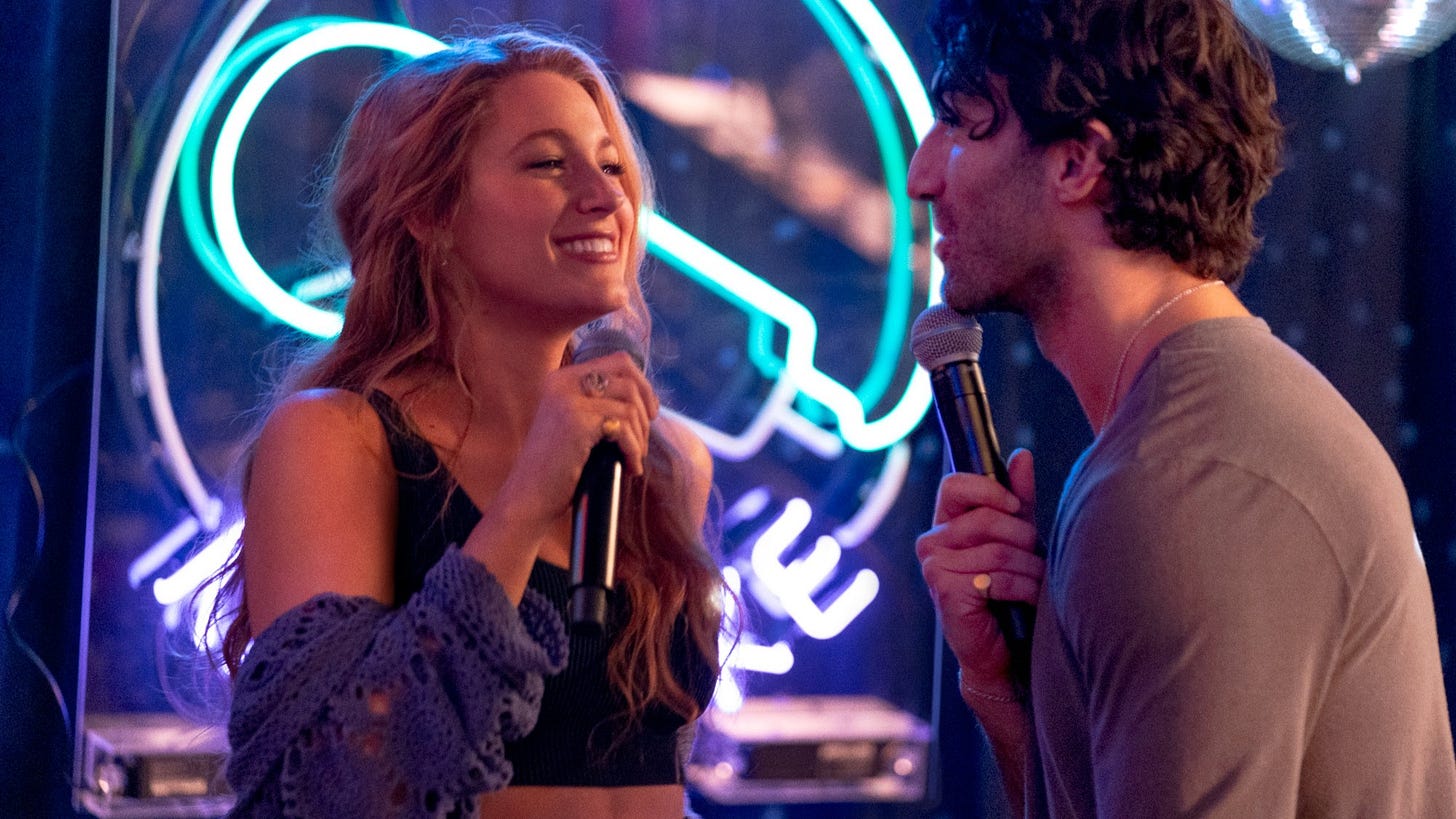Reviews For 'It Ends With Us' and 'Borderlands,' Plus Apple Chickens Out on Theaters While 'Deadpool 3' Tops $900M
'Saturday Night' gets a solid, unpretentious trailer while those justifiably annoyed with 'Coyote Vs. ACME' getting shelved will have a chance to vote with their wallets.
In tonight’s “making up for lost time” newsletter...
- Borderlands isn’t good, but watching Cate Blanchett as an action-hero badass in a detailed and colorful fantasy world isn’t the worst way to spend 95 minutes.
- It Ends with Us (which will be *huge*) deftly avoids some of the alleged trouble spots of the book. However, in one skewed way, it reminded me of the 2019 flop Serenity.
- Deadpool & Wolverine will pass $1 billion on Sunday, and it may end up among the top five biggest-grossing R-rated movies even when adjusted for inflation.
- Apple seems to be taking its ball and going home, preferring a quiet death on Apple TV+ to more high-profile (and tangible) theatrical box office bombs. Oh well.
- A Looney Tunes movie is coming to theaters, but will everyone (justifiably) annoyed about Coyote Vs. ACME getting shelved put their money where their mouth is?
- Jason Reitman and Gil Kenan’s Saturday Night gets an intense, unpretentious tease.
Borderlands, which once might have been an event film, is now barely a B-movie.
I wrote a piece for Forbes in May 2014 about the triple commercial failures of I, Frankenstein, The Legend of Hercules and Pompeii. None of these were underappreciated masterworks, although Paul W.S. Anderson’s skewed mash-up of Titanic and Gladiator qualified as (like many of his genre efforts) solid “B-movie fun.” Their indifferent reception stuck out because all three films had a level of spectacle and effects-driven action that, in a prior time, would have made them automatic A-level theatrical events. Even a decade ago, they now barely qualified as “B movies.” I kept thinking back to those three films while watching Eli Roth’s Borderlands.
No, it’s not particularly good, and frankly, it drop-kicks any built-up goodwill via its (being vague to avoid spoilers) Konami Code finale. But it’s a $120 million-budgeted (partially via long-gestating reshoots and with 60% of that already accounted for via foreign pre-sales) sci-fi action spectacular from a major studio with a genuine “all-star cast” based on a well-liked video game that’s barely rising to the cultural and commercial level of “C-movie.” Granted, the history of “well-liked video game” being a “butts in seats” franchise draw is a near-coin toss, regardless of which ones turned out to be lousy movies. That being said...
Eli Roth’s Borderlands has visual panache and style to spare, again making me wonder the extent to which the last few years of “Why do movies look bad?” discourse was mostly about (some but not all) post-Endgame MCU movies, streaming flicks and a handful of “shot during COVID” tentpoles. It’s not the next Avatar or anything, even if they both amusingly concern a fantasy land called Pandora. Still, it looked lovely and colorful in my TCL Imax “fan screening,” and there was a refreshing attention to detail in its post-apocalyptic locations. One “easy” way for Marvel to regain some of its mojo is by recommitting to being among the most visually scrumptious tentpoles around.
Have I been so beaten down by changing cinematic norms that something frankly on the level of League of Extraordinary Gentlemen now struck me as “better than I feared?” Not having played the video game(s), the film kinda-sorta works as a new-to-me adaptation that cribs from Escape from New York, Star Wars and Indiana Jones and the Last Crusade, with some Guardians of the Galaxy thrown in for good measure. And if nothing else, Cate Blanchett relishes the opportunity to be a rough-and-tumble anti-hero in a big-budget sci-fi action fantasy. Jokes about the star of Tár headlining a video game movie aside, she’s having a blast.
If you want to see Blanchett be stupidly sexy/cool while striking action poses for 95 minutes, that’s the price of admission right there. Jack Black’s talking robot is mostly amusing, while Kevin Hart (his first live-action theatrical role since Jumanji: The Next Level in late 2019) seems determined to play a straight, non-wisecracking action hero, while Édgar Ramírez is inexplicably terrible as the heavy. It’s another “bad” video game movie, albeit existing in an age where Angry Birds Movie 2, Rampage, Detective Pikachu and the Sonic movies are genuinely good, while The Super Mario Bros. Movie is a $1.3 billion-grossing blockbuster.
However, if Hollywood does want to make video games into “the next comic books” in terms of newer adaptable I.P., they might do well to (noting both this film and the otherwise quite good Sonic the Hedgehog 2) avoid turning their films into glorified superhero movies. Returning to Borderlands as a 2024 variation on (the superior) Pompeii, the problem is the same. In a world where movies like this weren’t mega-budget affairs and/or must-succeed ventures in I.P. management, while movie tickets were less expensive, Borderlands would qualify as a harmless Saturday matinee. However, in 2024, Borderlands isn’t good enough or cheap enough (either to produce or to see in multiplexes) to merit anything other than a shrug.
Why It Ends with Us reminded me of... Serenity?
If last night’s paid “early access” screenings are any indication – and my 7 pm was *packed*, This Ends with Us will be a monster this weekend. It seems to avoid some of the allegedly controversial elements of Colleen Hoover’s blockbuster novel, partially because I can’t imagine anyone walking into the film being surprised when it becomes a drama about domestic abuse. That was a point of contention from the novel, which (allegedly) read like a glossy romantic melodrama until the male lead (played with star-making smolder by director Justin Baldoni) starts being abusive. That seems like an unfair criticism in the vein of folks taking issue with Frozen not leaving clues to Hans’ third-act heel turn, but #BookTok is not exactly my scene.
The hype and fair-play marketing (more upfront about its subject matter than, for example, Passengers) should avoid any surprises. As for the movie, it’s an unapologetic melodrama through and through, fully aware that we do still go to the movies to watch impossibly gorgeous people existing well behind their means living ordinary lives with relatable problems. It has a kind of unassuming big city splendor and polish that used to be “just a Hollywood movie.” Concurrently, the narrative beats and character turns are only even remotely “problematic” if you take it as a zero-sum Hollywood take on domestic violence versus a specific story about specific people making specific choices. My “problems” with the movie are two-fold, one of which has little to do with the film itself.
First, the insertion of a teenage first love (played as kids by Isabela Ferrer and Alex Neustaedter) at first seems to be a “past informs the present” fable, noting our heroine’s moral decency and the mere idea that folks dealt a lousy hand can still be good people and worthy of happiness. However, this young man reappears at around the halfway mark, which A) begins the film’s darker storytelling but also B) turns the picture into a skewed “Who will she choose?” flick. Moreover, as the film progresses into its third act, the two men in Lily’s life come to so vividly represent a metaphorical virgin/whore dynamic, complete with competing economic standing, that It Ends with Us eventually resembles a stereotypical late 2000s Tyler Perry drama.
Second, I sympathized (in a skewed way) with those who had read the book relatively unaware of the harsher subject matter. There are so few mid-budget, star-driven, major studio romantic dramas made at the wide-release theatrical level – and this film is allowed to be old-school sexy in a way that feels almost foreign to 2020s cinema (see also: Denzel Washington’s Michael B. Jordan-starring A Journal For Jordan) -- that it’s almost a shame that the big one we’re getting is discreetly a drama about recognizing and coping with unexpected violence in an intimate relationship.
Notwithstanding quality differentials, I was reminded of how Matthew McConaughey and Anne Hathaway’s Serenity was pitched as a rare throwback to star-driven erotic thrillers only to reveal itself as set inside a child’s video game. Again, we get so little of the genuine article. That said, the notion of It Ends with Us opening on the level of The Fault in Our Stars ($48 million in 2014) is the definition of “good for the industry and the soul.”
Josh Boone’s cancer-stricken love story is a far better film (Shailene Woodley deserved an Oscar nomination), a deeply popular best-seller aimed at women and/or girls pulling blockbuster business – with the help of Blake Lively’s genuine bankability (A Simple Favor, The Shallows and The Age of Adeleine all opened with around $15 million with budgets that made that a relative success) -- may well be one of the happiest box office stories of the summer. And if Hoover becomes the next Grisham or Nicolas Sparks, thus justifying more than just franchise-friendly action fantasies, it’s all the better.





